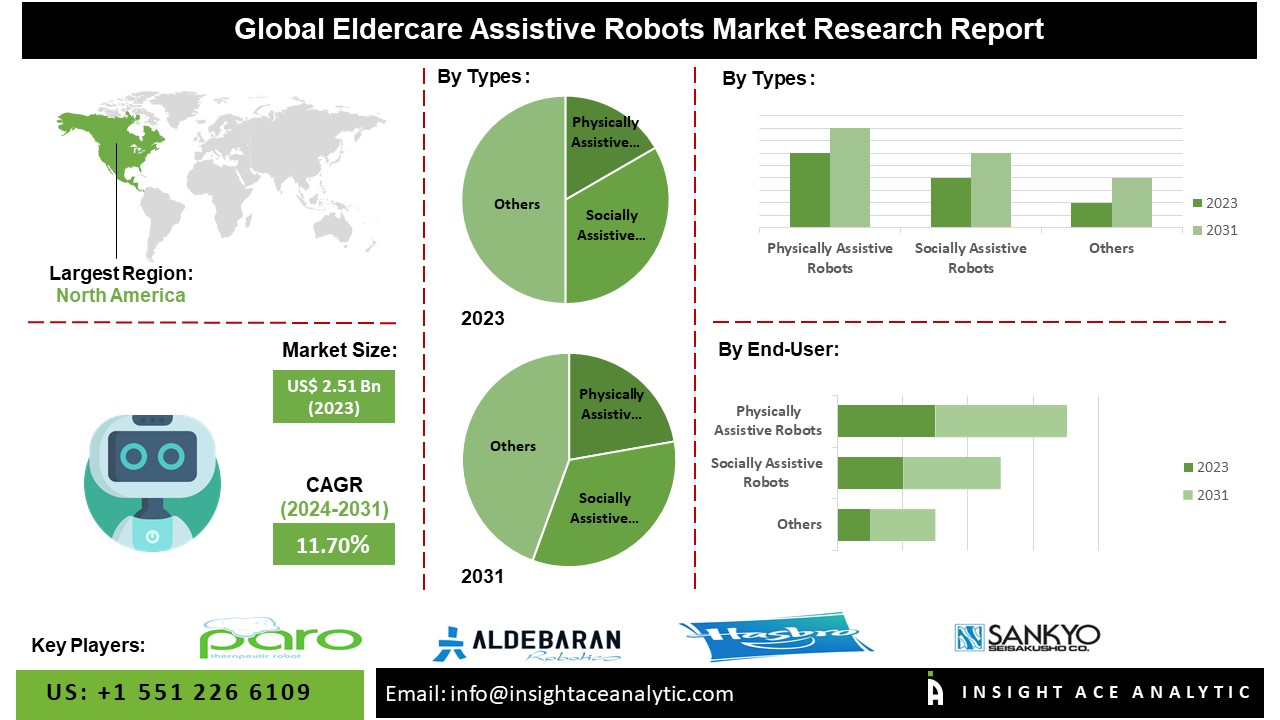InsightAce Analytic Pvt. Ltd. announces the release of a market assessment report on the “Global Eldercare-Assistive Robots Market – (By Type (Physically Assistive Robots, Socially Assistive Robots), Trends, Industry Competition Analysis, Revenue and Forecast To 2031.”
According to the latest research by InsightAce Analytic, the Global Eldercare-Assistive Robots Market is valued at US$ 2.5 Bn in 2023, and it is expected to reach US$ 5.9 Bn by 2031, with a CAGR of 11.7% during the forecast period of 2024-2031.
Eldercare assistive robots not only perform medical tasks in the capacity of medical professionals, but they also offer companionship reminiscent of that of a human being to the patient. The company of elderly people can have a significant positive impact on both their physical and emotional wellbeing. By performing duties such as reinforcing patients daily schedules and critical information, these automated systems have the potential to offer significant support, especially to those afflicted with conditions such as dementia. It is anticipated that assistive robots will own the most market share in the robotics industry. These robotic systems execute their designated functions and find predominant application in medical and household settings. Surgical robots, dietary supports, robotic manipulators, and dynamic arm supports are all classified as stationary assistive robots. The increasing global demand for surgical robots is anticipated to propel the stationary assistive robots market in the manufacturing sector.
Request for Sample Pages: https://www.insightaceanalytic.com/request-sample/2469
List of Prominent Players in the Eldercare-Assistive Robots market:
- Paro Robots
- SoftBank Robotics
- Togo Seisakusyo Corporation
- Taylor & Francis Group
- Robohub
- Aldebaran
- Hasbro
- Toyota Motor Corporation,
- Panasonic Corporation,
- Honda Motor Co., Ltd.,
- Cyberdyne Inc
- Kinova
- Omron Corporation
- Teradyne
- Ateago Technology
- Labrador Systems
- Other Market Players
Market Dynamics:
Drivers-
The ageing population in developed countries drives the market during the forecast period. Caregiving for this demographic will require physical, mental, and emotional work. Thus, this work requires more qualified and available medical staff. Thus, eldercare assistive robots could benefit this demographic. Even as they mature, people seek independence. Healthcare institutions like nursing homes are typically less appealing than the privacy, comfort, and security of home. These requirements make eldercare assistive robots useful. These reasons may increase eldercare assistive robot demand over the predicted period.
Challenges:
The prime challenge of the market consists of the high initial investment. The cost of developing and deploying eldercare-assistive robots can be a prominent barrier to market growth. The high initial investment required for research and development, manufacturing, and maintenance limits the adoption of these robots, especially in developing regions. Robots in caregiving raises ethical concerns related to privacy, autonomy, and human interaction. Safety is also a crucial aspect, as the robots need to operate in close proximity to vulnerable individuals. Concerning these concerns and ensuring the safety of both older people and robots remains a challenge. There needs to be more awareness and acceptance. It has potential benefits, but there is still limited awareness and acceptance of eldercare-assistive robots among the elderly and their caregivers. Education and outreach programs are necessary to promote understanding and trust in the capabilities and reliability of these robots.
Regional Trends:
The North American Eldercare-Assistive Robots market is expected to have a major market share and is projected to grow at a high CAGR in the near future. Growing population, rapid urbanization, and increasing industrialization, along with increasing R&D activities by prominent players, are factors expected to proliferate the growth of the eldercare assistive robot market in the region. Besides, Europe also had a substantial share of the market due to the developed economy and increasing adoption of the product, along with the adoption of new strategies by the major key players in the Eldercare-Assistive robot market. Furthermore, the increasing number of key players and collaboration among them in the region has led to the growth of the global elder care-assistive robots market.
Curious About This Latest Version Of The Report? Enquiry Before Buying: https://www.insightaceanalytic.com/enquiry-before-buying/2469
Recent Developments:
- In November 2022, Labrador Systems announced its intention to begin implementing its innovative assistive robots, specifically developed to offer assistance to elderly folks and those in need of daily life care. This technology possesses the capacity to revolutionize the domain of senior care in its entirety. The Labrador Retriever personal robot is designed to streamline the daily activities of elderly individuals.
Segmentation of Eldercare-Assistive Robots Market –
By Type-
- Physically Assistive Robots
- Socially Assistive Robots
By Region-
North America-
- The US
- Canada
- Mexico
Europe-
- Germany
- The UK
- France
- Italy
- Spain
- Rest of Europe
Asia-Pacific-
- China
- Japan
- India
- South Korea
- South East Asia
- Rest of Asia Pacific
Latin America-
- Brazil
- Argentina
- Rest of Latin America
Middle East & Africa-
- GCC Countries
- South Africa
- Rest of Middle East and Africa
For More Customization @ https://www.insightaceanalytic.com/customisation/2469
Media Contact
Company Name: InsightAce Analytic Pvt. Ltd
Contact Person: Diana D’Souza
Email: Send Email
Country: United States
Website: https://www.insightaceanalytic.com/

